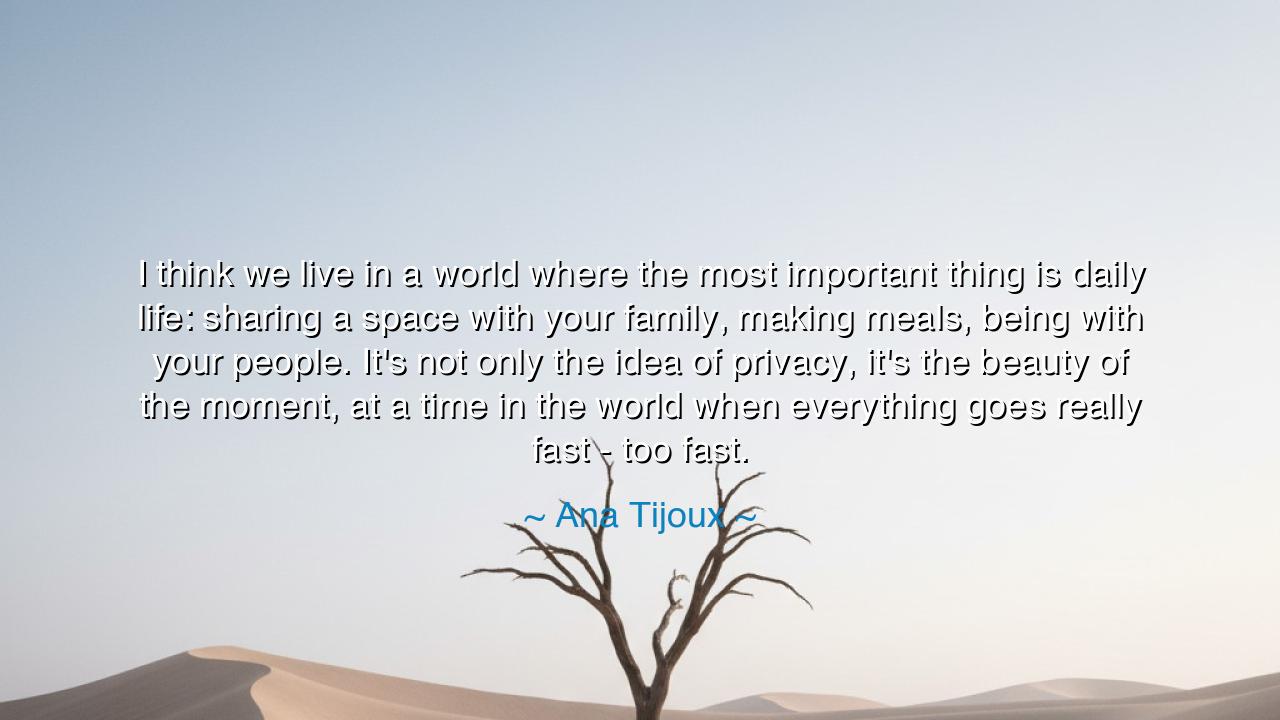
I think we live in a world where the most important thing is
I think we live in a world where the most important thing is daily life: sharing a space with your family, making meals, being with your people. It's not only the idea of privacy, it's the beauty of the moment, at a time in the world when everything goes really fast - too fast.






Hear the words of Ana Tijoux, poet of rhythm and voice of the soul, who said: “I think we live in a world where the most important thing is daily life: sharing a space with your family, making meals, being with your people. It's not only the idea of privacy, it's the beauty of the moment, at a time in the world when everything goes really fast—too fast.” These words are not light nor fleeting; they are an anchor against the raging current of modern times. In them lies a call to remembrance: that the true wealth of life is not found in the speed of ambition, nor in the glitter of distraction, but in the quiet, sacred rituals of the everyday.
For what is daily life but the hearth of existence, the fire around which humanity has gathered since the dawn of time? To share a space with one’s family, to prepare food, to sit in the warmth of companionship—these are acts older than kingdoms, older than empires, older even than the written word. Tijoux reminds us that these humble actions are not small, but eternal. They are the rhythm of the human heart, often drowned out by the clamor of a world that moves “too fast.”
History bears witness to this truth. Consider the tale of Marcus Aurelius, emperor of Rome, who ruled vast armies and governed a mighty empire. Yet in his private writings—the Meditations—he did not exalt conquest or triumph. Instead, he spoke of stillness, of simplicity, of gratitude for the daily acts of life. Though he wore the purple robe of empire, he knew that the greatest treasures were not in palaces or wars, but in the quiet moments of presence, in the time given to family and self. Like Tijoux, he understood that speed without meaning leads only to emptiness.
Think also of the world’s sages and prophets. The Buddha found enlightenment not in the rush of activity, but in the stillness of meditation under a tree. The Christ broke bread with his disciples, teaching that the act of a shared meal could reveal the divine. In every tradition, the holy is found not only in the heavens, but in the moments of daily life—moments of presence, slowness, and love. Tijoux’s words are another echo of this ancient wisdom, reminding us that life’s beauty hides in the ordinary, if only we would pause long enough to see it.
And yet, how easily we are ensnared by the illusion of speed. The world presses upon us with its machines and its endless urgencies; it demands that we run, achieve, consume, and compete. In this endless race, the very soul of living is threatened. Tijoux warns that in such a world, to slow down and treasure the beauty of the moment is not weakness but resistance, not indulgence but survival. For the one who can stop, breathe, and dwell with loved ones has already triumphed against the tyranny of haste.
The lesson, O seeker, is this: do not despise the small acts of your day, for they are the pillars of your life. When you sit with your family, when you share food, when you laugh together in the evening—these are not distractions from greatness, they are greatness. Guard these moments with fierce devotion, for they are the soil from which strength, peace, and joy grow. To miss them is to chase shadows, but to hold them is to grasp eternity.
In your own life, then, take this counsel: slow your steps. Do not let the world’s pace dictate your own. Make time for meals shared, for conversations unhurried, for silences filled with presence. These things will not appear on records of achievement, nor on lists of profit, but they will shape the soul of your days. And when you reach the twilight of your years, it will not be speed or success you remember, but the faces around your table, the warmth of love, the beauty of the moment.
So let Tijoux’s words echo in your heart: life is not found in the rush, but in the sharing of space, the breaking of bread, the stillness of now. Protect these treasures, live them fully, and you will not be carried away by the flood of haste, but will stand as one who has known what it means to truly live.






AAdministratorAdministrator
Welcome, honored guests. Please leave a comment, we will respond soon